Audi Q4 e-tron vs BMW iX1 - Differences and prices compared
Compare performance (340 HP vs 313 HP), boot space and price (39600 £ vs 41800 £ ) at a glance. Find out which car is the better choice for you – Audi Q4 e-tron or BMW iX1?
Costs and Efficiency:
Looking at overall running costs, both models reveal some interesting differences in everyday economy.
Audi Q4 e-tron has a slight advantage in terms of price – it starts at 39600 £ , while the BMW iX1 costs 41800 £ . That’s a price difference of around 2271 £.
In terms of energy consumption, the advantage goes to the BMW iX1: with 15.80 kWh per 100 km, it’s barely noticeable more efficient than the Audi Q4 e-tron with 15.90 kWh. That’s a difference of about 0.10 kWh.
As for electric range, the Audi Q4 e-tron performs to a small extent better – achieving up to 554 km, about 91 km more than the BMW iX1.
Engine and Performance:
Power, torque and acceleration are the classic benchmarks for car enthusiasts – and here, some clear differences start to show.
When it comes to engine power, the Audi Q4 e-tron has a slight edge – offering 340 HP compared to 313 HP. That’s roughly 27 HP more horsepower.
In acceleration from 0 to 100 km/h, the Audi Q4 e-tron is minimal quicker – completing the sprint in 5.40 s, while the BMW iX1 takes 5.60 s. That’s about 0.20 s faster.
There’s no difference in top speed – both reach 180 km/h.
There’s also a difference in torque: Audi Q4 e-tron pulls distinct stronger with 679 Nm compared to 494 Nm. That’s about 185 Nm difference.
Space and Everyday Use:
Cabin size, boot volume and payload all play a role in everyday practicality. Here, comfort and flexibility make the difference.
Both vehicles offer seating for 5 people.
In curb weight, BMW iX1 is slight lighter – 1940 kg compared to 2035 kg. The difference is around 95 kg.
In terms of boot space, the Audi Q4 e-tron offers minimal more room – 535 L compared to 490 L. That’s a difference of about 45 L.
In maximum load capacity, the BMW iX1 performs minimal better – up to 1495 L, which is about 5 L more than the Audi Q4 e-tron.
When it comes to payload, Audi Q4 e-tron hardly perceptible takes the win – 515 kg compared to 495 kg. That’s a difference of about 20 kg.
Who wins the race?
The Audi Q4 e-tron proves to be wins the duel decisively and therefore becomes our DriveDuel Champion!
Audi Q4 e-tron is the better all-rounder in this comparison.
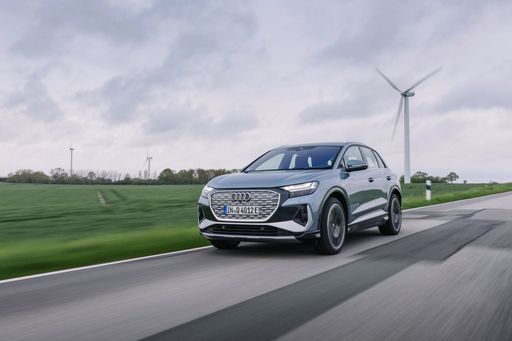
Audi Q4 e-tron
Costs and Consumption
View detailed analysis
Engine and Performance
View detailed analysis
Dimensions and Body
View detailed analysis
Audi Q4 e-tron
The Audi Q4 e-tron brings Audi polish into the electric crossover scene, pairing a sleek exterior with a refined, airy interior that makes everyday driving feel distinctly premium. It’s an easy-to-live-with EV that balances comfort and real-world usability with intuitive tech, making it a smart choice for buyers who want electric mobility without giving up Audi character — and yes, it still looks good in the driveway.
details
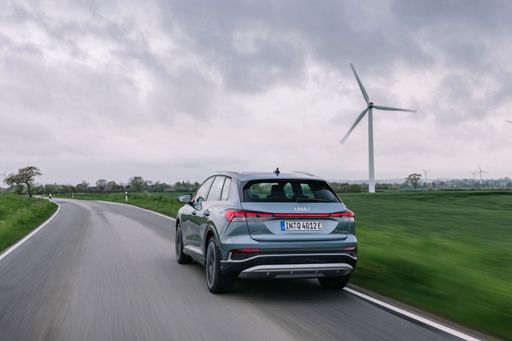
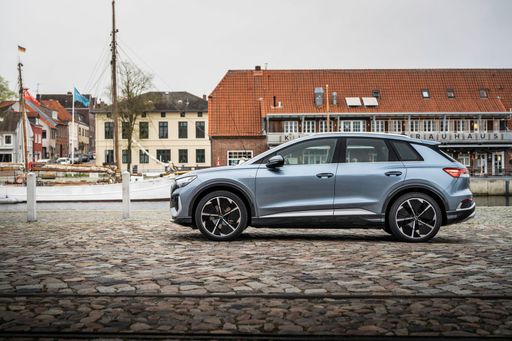
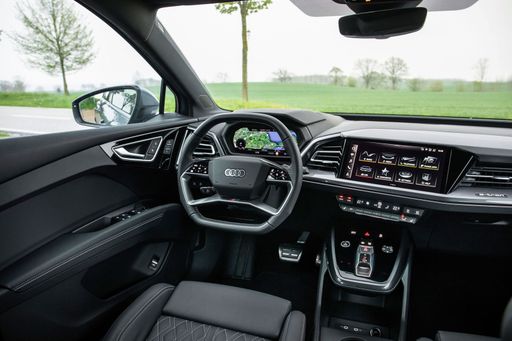
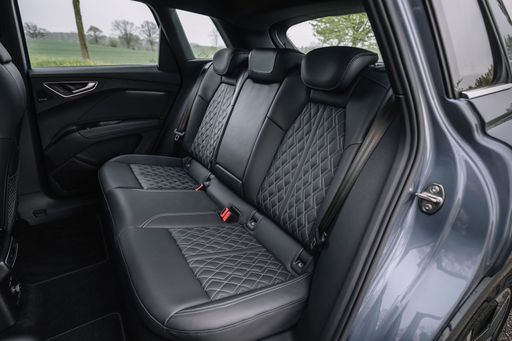
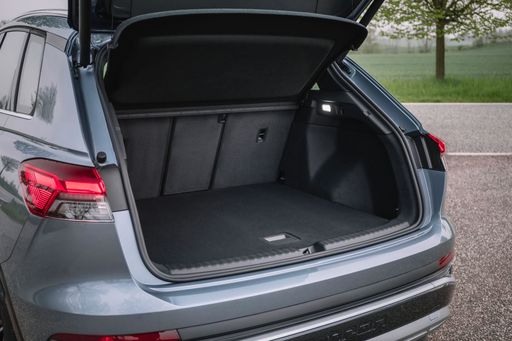
BMW iX1
The BMW iX1 wraps BMW's electric ambition into a compact SUV package that feels unexpectedly premium, with sharp handling and a crisp, modern cabin that keeps the driver in charge. It's ideal for buyers who want a stylish, quiet daily driver with useful practicality and tech-savvy touches — plus enough character to make the commute feel less like a chore and more like a short joyride.
details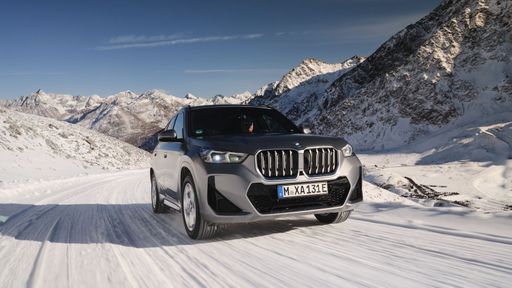
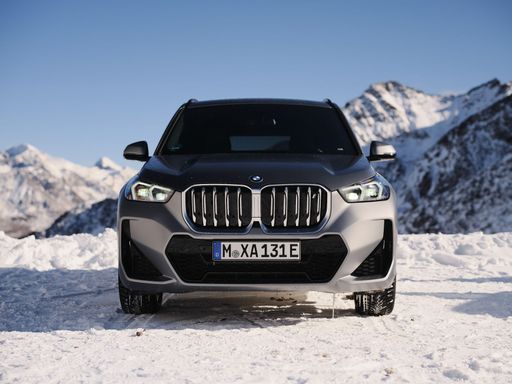
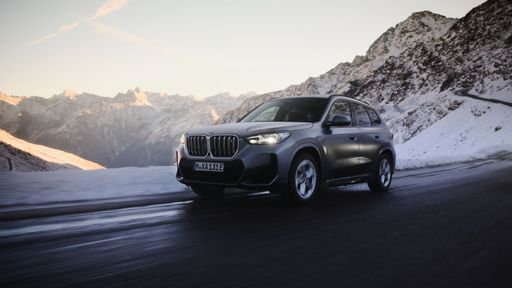
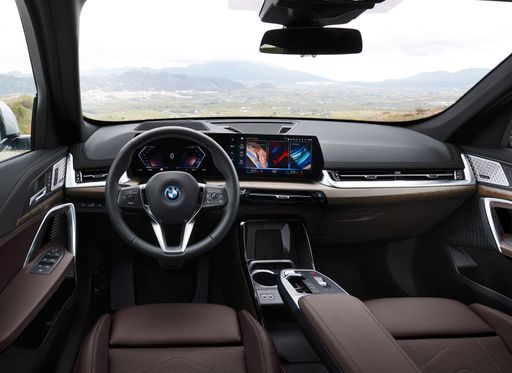
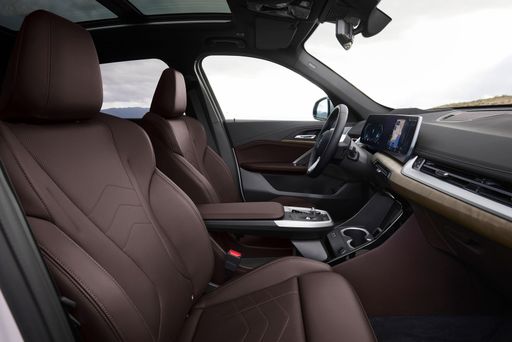
Costs and Consumption |
|
|---|---|
|
Price
39600 - 58800 £
|
Price
41800 - 54600 £
|
|
Consumption L/100km
-
|
Consumption L/100km
-
|
|
Consumption kWh/100km
15.9 - 17.4 kWh
|
Consumption kWh/100km
15.8 - 17.1 kWh
|
|
Electric Range
406 - 554 km
|
Electric Range
436 - 463 km
|
|
Battery Capacity
59 - 77 kWh
|
Battery Capacity
64.80 kWh
|
|
co2
0 g/km
|
co2
0 g/km
|
|
Fuel tank capacity
-
|
Fuel tank capacity
-
|
Dimensions and Body |
|
|---|---|
|
Body Type
SUV
|
Body Type
SUV
|
|
Seats
5
|
Seats
5
|
|
Doors
5
|
Doors
5
|
|
Curb weight
2035 - 2235 kg
|
Curb weight
1940 - 2085 kg
|
|
Trunk capacity
520 - 535 L
|
Trunk capacity
490 L
|
|
Length
4588 mm
|
Length
4500 mm
|
|
Width
1865 mm
|
Width
1845 mm
|
|
Height
1614 - 1632 mm
|
Height
1616 mm
|
|
Max trunk capacity
1460 - 1490 L
|
Max trunk capacity
1495 L
|
|
Payload
505 - 515 kg
|
Payload
495 kg
|
Engine and Performance |
|
|---|---|
|
Engine Type
Electric
|
Engine Type
Electric
|
|
Transmission
Automatic
|
Transmission
Automatic
|
|
Transmission Detail
Reduction Gearbox
|
Transmission Detail
Reduction Gearbox
|
|
Drive Type
Rear-Wheel Drive, All-Wheel Drive
|
Drive Type
Front-Wheel Drive, All-Wheel Drive
|
|
Power HP
204 - 340 HP
|
Power HP
204 - 313 HP
|
|
Acceleration 0-100km/h
5.4 - 8.1 s
|
Acceleration 0-100km/h
5.6 - 8.6 s
|
|
Max Speed
160 - 180 km/h
|
Max Speed
170 - 180 km/h
|
|
Torque
310 - 679 Nm
|
Torque
250 - 494 Nm
|
|
Number of Cylinders
-
|
Number of Cylinders
-
|
|
Power kW
150 - 250 kW
|
Power kW
150 - 230 kW
|
|
Engine capacity
-
|
Engine capacity
-
|
General |
|
|---|---|
|
Model Year
2023 - 2025
|
Model Year
2022 - 2023
|
|
CO2 Efficiency Class
A
|
CO2 Efficiency Class
A
|
|
Brand
Audi
|
Brand
BMW
|
What drive types are available for the Audi Q4 e-tron?
The Audi Q4 e-tron is offered with Rear-Wheel Drive or All-Wheel Drive.




